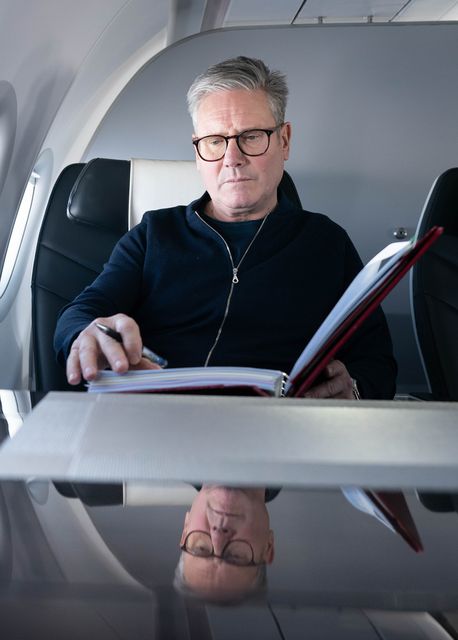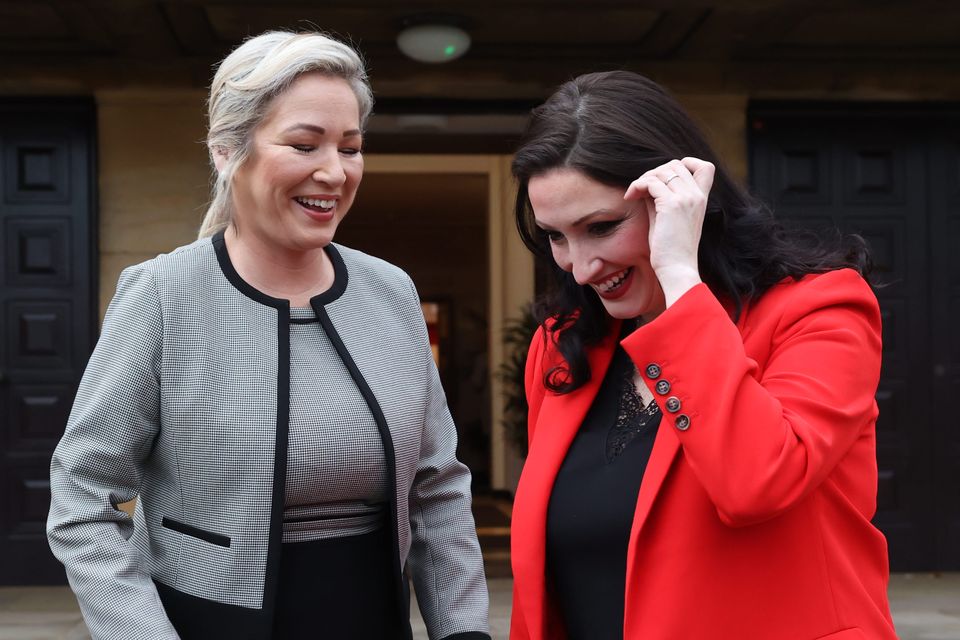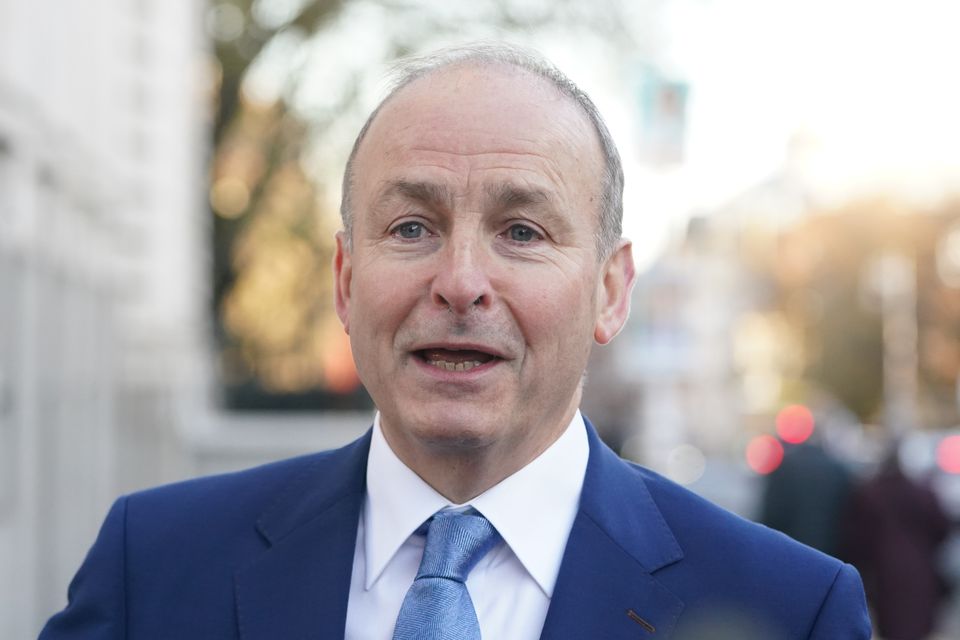Legally challenging the UK Government over Irish unity votes is “an option”, Sinn Fein leader Mary Lou McDonald has said.
Ms McDonald said successive UK governments have failed to provide clarity on its position for the preconditions or “tipping point” where a referendum would be held.
The Sinn Fein leader said: “I don’t think that’s a sustainable position.
Prime Minister Sir Keir Starmer said when he was in opposition that a referendum on Irish unification was ‘not even on the horizon’ (Stefan Rousseau/PA)
“I think now this new British Government under Keir Starmer needs to set out their stall.”
Under the terms of the Good Friday Agreement of 1998, the UK Government is obliged to call a referendum in Northern Ireland if there is evidence of a shift in public opinion in favour of unity.
In that event, there would be a simultaneous vote in the Republic of Ireland.
Earlier this year, Prime Minister Sir Keir said he was committed to the principles of the Good Friday Agreement.
However, while in opposition he said a referendum on Irish unification was “not even on the horizon”.
Asked on Friday if Sinn Fein would consider a legal challenge against the British Government to force it to provide clarity on its decision making, Ms McDonald said Ireland had previously challenged the UK in the courts over legacy legislation.
She said: “Would (a legal challenge) be our first option? No.
“Is that option available to the Irish state? Yes.”
Ms McDonald said it was open to any citizen to challenge the UK Government on the terms of the Agreement.
She added: “Our first choice is political and diplomatic.”
Meanwhile, Ms McDonald also criticised the leader of Fianna Fail for saying he did not believe a border poll would happen within five years.
She made the remarks as she launched Sinn Fein’s latest policy document on its long-held ambition for a united Ireland.
Ms McDonald told reporters in Dublin: “We need a mature, respectful conversation about constitutional change.
“It’s a conversation that should be approached with optimism, with ambition and with the real sense of opportunity.
“Of course, the conversation must be inclusive. It has to recognise that people hold competing and different views about the future.
“It has to recognise the reality that partition has hurt Ireland politically and economically, and that we now have a chance to change all of that. It’s time to plan and prepare for a united Ireland.”
The General Election policy document expands on the party’s plans to work towards holding referendums for Irish unification by the end of the decade, under the provisions of the Good Friday Agreement.
The party would also appoint a junior minister focused on reunification, and initiate a “diplomatic offensive to promote Irish unity”.
Ms McDonald said she would seek support from US President-elect Donald Trump and other American politicians “across the aisle”.
It would establish citizens assemblies to discuss the constitutional future of Ireland and “prepare for an Irish national health service”.
Asked if the Irish flag would change in a united Irish state, Ms McDonald said the current tricolour represents an alliance between “the Gael and the Planter”.
She said: “For me the flag – the green, the white and the orange – represents all of our traditions.
“The entente between the orange and the green – the Gael and the Planter. So I see no reason to change the flag.”
Ms McDonald said she personally saw no reason to change the flag or the anthem, but accepted others would have differing views.
She said there was now a need to prepare for Irish unification in a better way than what was seen during Brexit.
During the time leading up to the UK’s withdrawal from the European Union, the DUP refused to engage with all-island talks established by then-Irish premier Enda Kenny.
Asked if Sinn Fein expected to proceed with its preparations for unity without engagement from the DUP, Ms McDonald said: “At that time, the argument was made that: ‘What’s the point in extending it to the north? Unionism won’t come’.
“And correct, the DUP didn’t come, but the Alliance Party did, and unionism came. It came as hauliers, agriculture, business.
“So we have to have the objective that every political party, all political representatives, will not just come and participate, but will feel very welcome coming and participating and their views and perspectives valued.”
Ms McDonald said it would be a mistake to reduce unionism to individual political parties, adding that there had been a “sea change” in how Protestants, unionists and loyalists engage with the conversation around unity.
She also said there had been “exciting” political advancements in Northern Ireland.
She pointed to Michelle O’Neill’s position as First Minister as something that was “against all odds” and “never supposed to happen”.
First Minister of Northern Ireland Michelle O’Neill with deputy First Minister Emma Little-Pengelly (Liam McBurney/PA)
One of the proposals in Sinn Fein’s plans is to change the rules of the Oireachtas parliament in Dublin to allow MPs from Northern Ireland to have speaking time.
Sinn Fein MPs do not take their seats at Westminster.
Asked if she believed this could see her as a future taoiseach taking questions in Dublin from TUV leader Jim Allister during Leaders’ Questions, she replied: “Well, I would very much welcome that – I’m not sure how Jim Allister would feel about it.”
Earlier on Friday, Fianna Fail leader Micheal Martin said he did not foresee a Fianna Fail government holding a border poll in the next five years.
He emphasised his work on the one-billion euro Shared Island Fund, which he described as the most important initiative for cross-border relationships since the Good Friday Agreement.
Tanaiste and Fianna Fail leader Micheal Martin (Brian Lawless/PA)
Speaking on Newstalk, Mr Martin added: “That’s the future, it’s about reconciliation. It’s about the old Wolfe Tone principle of uniting people, Protestant, Catholic and the centre.”
Ms McDonald said his position was “astonishing” and “irresponsible”, adding that she thought Fianna Fail believed in unity.
She said: “Change is happening, it’s evident that it’s happening. It needs to be managed and planned for – and I actually think it’s irresponsible of any political leader to refuse to plan for the future.”
Ms McDonald added: “I think it’s irresponsible, I think it’s short-sighted. I think it lacks ambition. I think it’s very much out of step with the opportunities that we now have as a country. We should be grasping opportunity, not pushing it away.”


